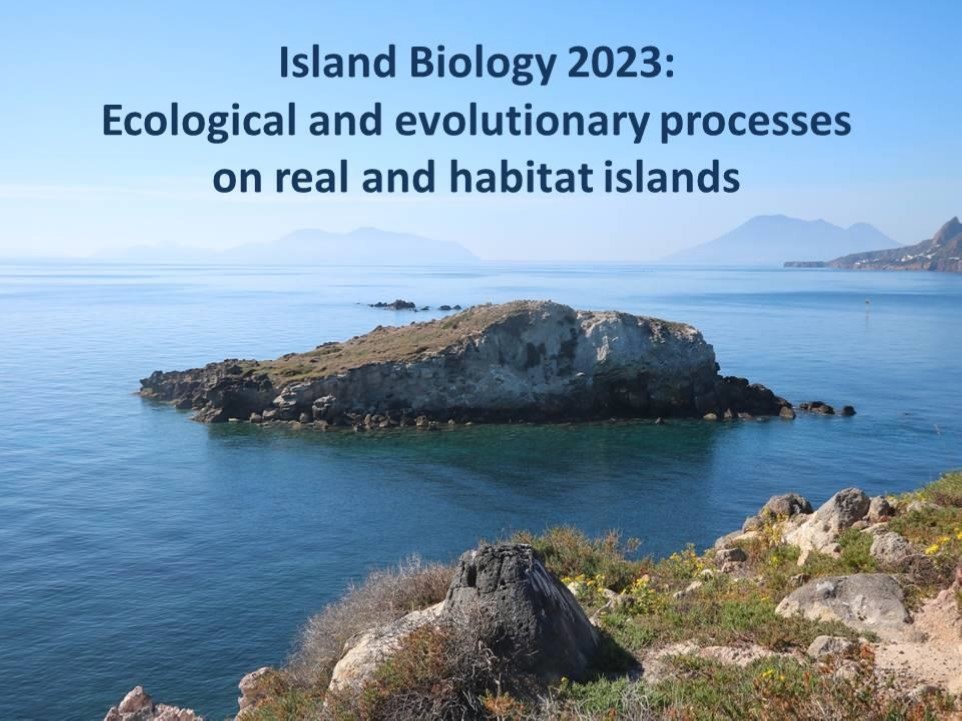The ISLAND BIOLOGY CONFERENCE 2023 (3rd – 7th July 2023)

The Aeolian Islands
The 4th Society of Island Biology Conference will take place on the 3rd – 7th July 2023, in the Aeolian Islands, a volcanic archipelago in the Tyrrhenian Sea, north of Sicily.
This archipelago (also referred to as the Lipari Islands) includes 7 main islands with a total surface of about 115 km2. There is still volcanic activity here, like steaming fumaroles, thermal waters and two active volcanoes – Stromboli and Vulcano.
The islands are named after the Greek god Aeolus, keeper of winds and king of the mythical, floating island of Aeolia. The legendary Odysseus, on his travels to return home from Troy, visited Aiolos island and was entrusted with an oxhide bag containing all of the winds to ensure a safe voyage home.
Since the Middle Neolithic that human settlers colonized these islands, which had a very fertile soil. Later on, the Greek colony of Lipára was known for its exports of Aluminum, Sulphur, and production of its own pottery wares. The fuelwood used in these industrial activities were most likely responsible for the collapse of the local forests.
Up to the 19th century, the Aeolian economy was successful, with the trade of local agricultural products and mineral extraction. But the economic crisis triggered massive emigration towards the Americas and Australia. This tendency was reversed in the last decades, thankfully to tourism, but this activity is currently a major threat to coastal ecosystems.
The conference will host the following sessions:
1) Island biogeography and macroecology
Island biogeographical studies have prompted research in the most disparate fields in the areas of biogeography and macroecology. Also, islands represent excellent natural laboratories for exploring patterns and testing mechanisms in these areas. This section will be dedicated to contributions dealing with the variety of approaches and issues central to island biogeography. Case studies, theoretical models, and reviews are welcome.
2) Conservation on islands
Because of their small size and isolation, islands host unique biotas with high levels of endemicity, thus contributing disproportionately to global biodiversity. However, islands are intrinsically fragile areas and most of documented extinctions occurred on islands. Also, studies conducted on islands can suggest methods and approaches which could also be applied for conservation on mainland. All issues involved in biological conservation on islands are welcome in this section.
3) Evolution of islands and their biotas
Understanding island evolution is essential to explain their biotas. Reconstructing island origin (e.g., land bridge vs. oceanic), age and historical transformations, are of extreme importance for developing and testing ecological and evolutionary hypotheses. Island histories are intimately associated with the evolution of their biotas, and isolated areas offer many exceptional opportunities for evolutionary studies. This section will be focused on (but not limited to) contributions dealing with island geology, paleogeography and paleoecology.
4) Island ecology
Islands offer exceptional opportunities for ecological research because of their simplified communities and unique characteristics. For instance, their reduced number of species may facilitate species inventorying and islands belonging to the same archipelago may serve as replicates. In contrast, because of their isolation, islands evolved populations and communities that may have very different characteristics from their continental counterparts. This section is dedicated to contributions exploring the role of islands in boosting research in ecological frontiers.
5) Humans and islands
Some islands are home to million people and human density in small islands can be extremely high. Human presence has profoundly shaped many island landscapes. Consequently, human-induced ecological transformations on islands are paradigmatic of processes and mechanisms of high general interest. Island characteristics obviously conditioned the history of human presence and the ecological trajectories of human populations. This section is devoted to contributions dealing with the influence of island features on the history, evolution, and current characteristics of human populations and societies.
Registration is OPEN!
Please, register at the link below: https://forms.gle/xuXUfYsdb73zwb5z7
Abstract submission at the link below: https://forms.gle/ayxdVvHeiLP9FKPG7
The venue
Hotel Aktea & Auditorium of Lipari
Via Paolo Borsellino e Giovanni Falcone, Lipari
Contacts
Conference Secretariat – Nesos
Flavia Grita, Pietro Lo Cascio, Carmelo Mustica
e-mail: SIB.Lipari2023@gmail.com
Deadlines
Early bird registration with reduced fees: March 5th, 2023
Abstract Submission: March 31st, 2023
Ordinary registration with normal fees: April 30th, 2023
Late-Breaking Abstract Submission: April 30th, 2023
Late Registration: June 4th, 2023
Other useful information:
– There is an optional pre-conference excursion;
– Number of attendees is limited to 400 people;
– At the time of the conference, the weather is expected to be warm and sunny, with an average temperature of 27°C (80°F).
